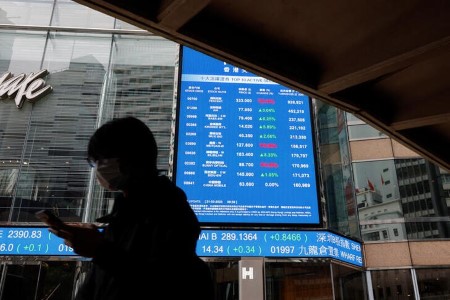




January Economic Update: Growth slows, prices rise
 DOWNLOAD
DOWNLOAD

Inflation Update: Up, up, and away?
 DOWNLOAD
DOWNLOAD

Quarterly Economic Growth Release: Growth takes on a slower pace
 DOWNLOAD
DOWNLOAD


Low volatility propping up risk appetite

April 20 (Reuters) – Stocks may be treading water as investors digest a mixed flow of US earnings and red hot UK inflation is pushing up global bond yields, but investors in Asia with a glass half full outlook on Thursday might want to latch on Wall Street’s volatility.
Or rather, lack of it.
The VIX index, also known as Wall Street’s fear gauge, fell on Wednesday to its lowest point since November 2021, and is below the average of the last 5, 10, 15 and 20 years.
Indeed, at 16.41 when the market closed on Wednesday, the VIX is comfortably below the average of 19.7 since the index’s inception in 1990.
Maybe investors are so underweight and short equity they don’t need downside protection, or the market’s resilience – still up 8% this year and up 10% from last month’s banking shock low – has calmed the horses.
Either way, extremely low US volatility generally bodes well for other stock markets. Asian stocks ex-Japan and Hong Kong tech on Wednesday had their worst day in three weeks – could they be poised for a rebound Thursday?
On the other hand, Tesla shares slid after the bell on Wednesday after the company missed market estimates for first-quarter margin.
And worrying UK inflation figures may extend a dark shadow over Asia. Figures on Wednesday showed that Britain was the only country in western Europe with double-digit inflation in March, prompting several banks to raise their UK rate outlook.
UK money markets are pricing in a further 75 basis points of tightening this year, taking the base rate up to 5%. Former BoE policymaker Andrew Sentence told BBC radio rates might have get closer to 6% to defeat inflation.
This matters for the rest of the world because it is a stark reminder of how sticky inflation can be and a warning to central banks that have paused their hiking cycles – of which there are several in Asia – to guard against complacency.
The inflation focus turns to New Zealand and Malaysia on Thursday, and forecasts for both are not all that encouraging. Malaysia’s annual CPI inflation is only expected to slow a tenth of one percent to 3.6%, and New Zealand inflation in Q1 is expected to rise.
Meanwhile, Australia’s central bank governor Philip Lowe addresses the media on Thursday and India’s central bank releases the minutes of its last policy meeting.
China’s central bank announces its latest decision on one- and five-year loan prime rates, and figures from Japan are expected to show the trade deficit widened in March.
Here are three key developments that could provide more direction to markets on Thursday:
– Australia – RBA Governor Philip Lowe speaks
– India – RBI publishes meeting minutes
– China loan rate decision
(By Jamie McGeever)
This article originally appeared on reuters.com





 By Reuters
By Reuters